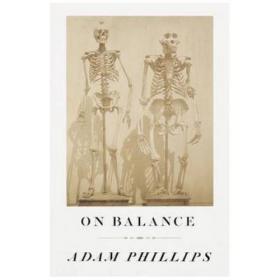
Very much in tune with The Atlantic‘s explosive chain of articles the last couple weeks on “having it all,” Phillips goes into the mind of the misbehaving child, the unrealistic expectations we have about being happy, how often good is associated brethren with happy, and the gift that acceptance can bring to human suffering and sadness. It comes from his book On Balance.
There is one fundamental experience that every parent has with their child, and that every school teacher has with the children they teach, which is: you can’t tell a child that they are not enjoying themselves, you can only tell them that they shouldn’t be. Think of a young child gleefully pinching his younger sister, or the child peeing on the carpet. As adults we know that we can’t tell someone that a joke isn’t funny–we can only tell them that they shouldn’t be amused. Children get pleasure from things that adults don’t want them to get pleasure from. And this, at least, lets us be clear about one thing: if we believe that school should make children happy, what we mean is that school should make them happy in ways we, the adults, approve of. We adults are the owners of the acceptable definitions of happiness. We don’t think school should make you happy about tormenting animals. As human creatures–and this is particularly vivid in school-age children–there are pleasures that make us happy which are unacceptable. And, of course, just to make the picture even more complicated, people can enjoy being, can want to be, unhappy. Talking about happiness at its worst can make us sound simple-minded; but it brings us up against all the difficult questions about pleasure, and therefore about what we think children should be protect from, and why.
Various people have said in various ways, at various times, that the truly valuable thing about psychonalysis is that it is the one place left in our culture where you can be, and be seen to be, wholeheartedly unhappy. And whatever this says about psychoanalysis, it seems to me to be more of a comment about the extreme pressure we are under these days, and that we put our children under, to be happy; which also means not to be unhappy. But what would it mean, as an adult, to be happy after watching the news, say? Or, as a child, to be happy after learning in school about the history of the slave trade? If you need to be happy, and need those around you to be happy too–in the same way that alcoholics need everyone around them to drink–then what do you do with your unhappiness? If the problem of the alcoholic is sobriety (not drink), then the problem of the happiness addict is his misery.
It is unrealistic, I think–and by ‘unrealistic’ I mean it is a demand that cannot be met–to assume that if all goes well in a child’s life he or she will be happy. Not because life is the kind of thing that doesn’t make you happy; but because happiness is not something one can ask of a child. Children, I think, suffer–in a way that adults don’t always realize–under the pressure their parents put on them to be happy, which is the pressure not to make their parents unhappy, or more unhappy than they already are. ‘Be happy’ can be a paradoxical injunction, like ‘be spontaneous’; if you do it you are not doing it. And the worst-case scenario could be generations of children cheated on what they were educated to believe was their right to happiness.
…So let us ask: what is being promoted in the name of happiness, and that means both what happiness is and what happiness might be the cover-story for? And what might the pursuit of happiness–in education and elsewhere–be distracting us from? If education should make you happy, what will have to be sacrificed in its pursuit? Can an adult who has a realistic sense of contemporary life be happy now? And if she can, what does she need not to notice and to feel in order to sustain her happiness? Do we really want our children to believe that only a happy life is a good life? How many of the people we admire from the past were happy? Because if happiness is pursued at all costs, the cost will be too great. We may end up by saying something like: education should be showing children good ways of bearing their unhappiness, and good ways of taking their happiness when it comes…I do think we need to ask: if education should make you happy, what is it going to have to make you in order for you be happy?
[youtube=http://www.youtube.com/watch?v=crUK6jSQSw8&w=550]

COMMENTS
Leave a Reply













